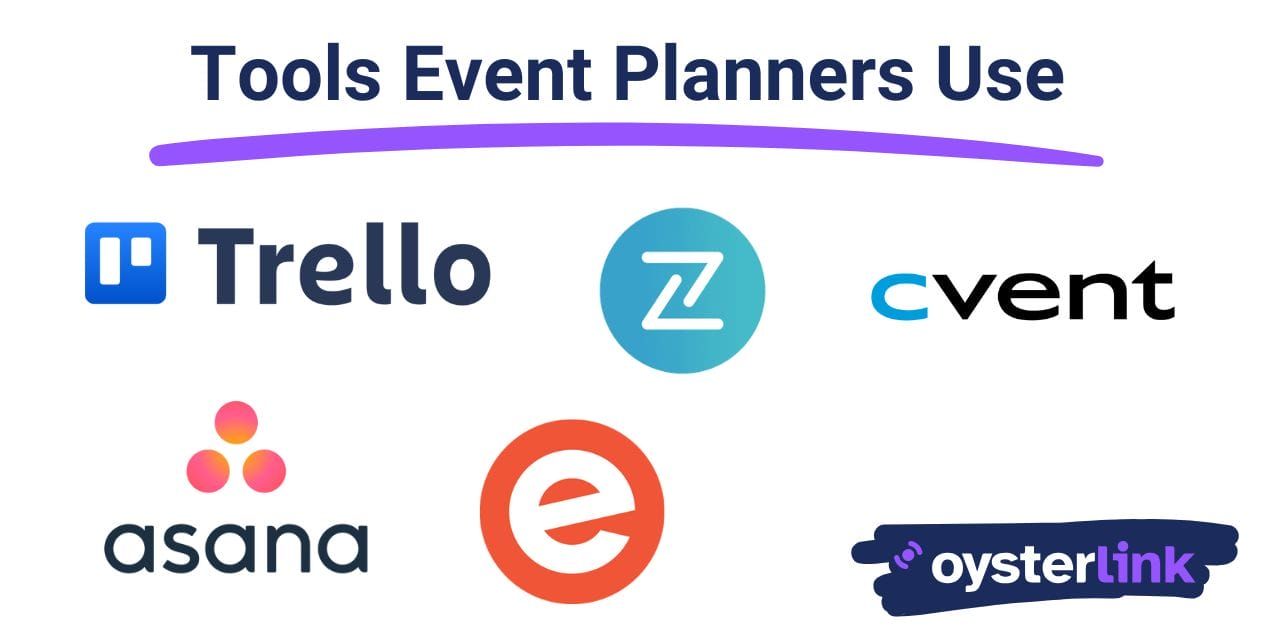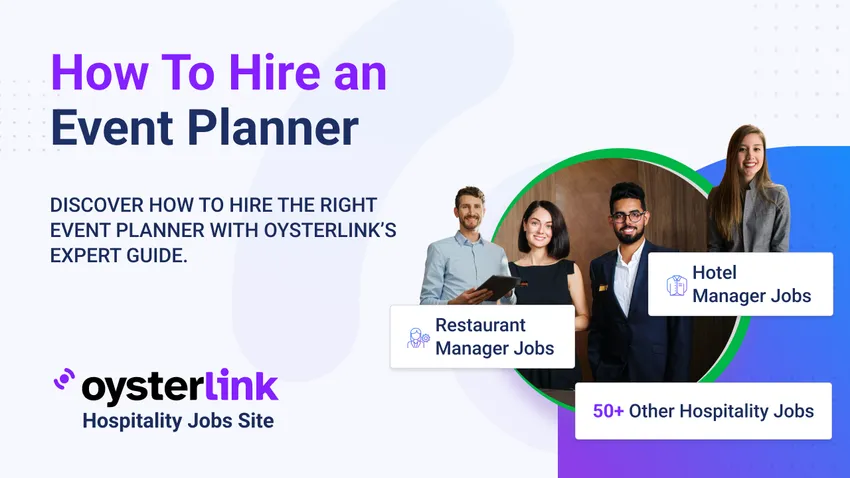Planning an event can be an overwhelming task, especially when you're juggling multiple responsibilities.
Whether you're organizing a corporate conference, a wedding or a charity fundraiser, the expertise of a professional Event Planner can make all the difference.
This comprehensive guide will walk you through the process of hiring an Event Planner, including what to look for in a potential candidate and how to post a job listing.
When To Hire an Event Planner?
Deciding whether to hire an Event Planner depends on various factors.
If you lack the time or resources to plan the event yourself, you might benefit from an Event Planner.
The same goes for a large-scale or complex event, where you can’t deal with all of the logistics yourself.
Benefits of hiring an Event Planner
Engaging an Event Planner offers numerous advantages:
- Time-saving: Event Planners handle time-consuming tasks, allowing you to focus on other priorities.
- Cost-effective: Their industry connections and negotiation skills can often lead to better deals with vendors.
- Stress reduction: Professional planners manage unexpected issues, reducing your stress levels.
- Creative input: They bring fresh ideas and innovative solutions to make your event stand out.
- Attention to detail: Event Planners ensure no aspect of your event is overlooked.
Steps To Hire an Event Planner
Finding the right Event Planner requires a systematic approach. Follow these steps to ensure you select the best professional for your needs.
1. Define your event requirements
Before beginning your search, clearly outline your event details:
- Event type and purpose
- Estimated guest count
- Desired date and location
- Budget constraints
- Specific themes or concepts
Having a clear vision will help you communicate your needs effectively to potential Event Planners.
2. Post a job ad
You can post a job ad on platforms like LinkedIn or even Indeed, but chances are you’re going to have difficulty finding a suitable candidate who’s local to you and has previous experience.
You’re much better off posting a job ad on a hospitality-specific platform such as OysterLink.
With OysterLink, you can create a job listing for $150 per post and find industry professionals who have the skills and experience needed to help make your event a success.
3. Review portfolios and past work
Once you have a decent amount of applications and portfolios to browse through, it’s time to examine them. Look for candidates who have:
- Experience planning events similar to yours in size and style
- Creative solutions and unique ideas
- Excellent attention to detail in event execution
- Client testimonials and reviews
A diverse portfolio showcasing successful events similar to yours is a good indicator of an Event Planner's capabilities.
4. Schedule interviews
Arrange interviews with your top candidates. Prepare a list of questions to assess their experience, skills and abilities.
A few questions you might ask an Event Planner candidate include:
- “What is your most successful event and what metrics did you use to track success?”
- “How do you ensure you get the best possible prices from vendors?”
- “If you’re asked for a last-minute change, would you be able to accommodate it?”
We have a full list of 35 Event Planner interview questions you can check out in case you need more inspiration.
5. Check references
If possible, request and contact references from each Event Planner.
Ask about their reliability and professionalism, their ability to stay within budget and how they handled challenges during the event.
Speaking with past clients provides valuable insights into the Event Planner's work ethic and results.
If an Event Planner has been in the industry for several years but can’t provide a single reference, it might be a sign they’re not capable of organizing and planning successful events.
6. Discuss budget and fees
Be transparent about your budget and discuss the Event Planner's fee structure. Common pricing models include:
- Flat fee for the entire event
- Percentage of the total event budget
- Hourly rate for services rendered
Ensure you understand what services are included in their fee and any additional costs you might incur.
If you’re hiring a full-time Event Planner, you can discuss the base salary as well as potential performance bonuses.
It's important to note most Event Planners work full-time in event planning companies or other establishments.
You can view more important statistics regarding Event Planners such as their average age on our demographics page.
7. Review and sign a contract
Once you've selected an Event Planner, review and sign a detailed contract. The agreement should outline:
- Scope of services
- Timeline and milestones
- Payment schedule
- Cancellation policy
- Liability and insurance details
A clear contract protects both parties and sets expectations for the planning process.
This is especially important if you’re hiring a full-time Event Planner since you’ll probably offer them health insurance, PTO, 401(k) and any other benefits your company might offer employees.
Understanding Event Planner Specializations
Event Planners often specialize in specific types of events or industries. Consider hiring a specialist if your event falls into a niche category.
Corporate Event Planners
These professionals focus on business-related events such as:
- Conferences and seminars
- Team-building retreats
- Product launches
- Shareholder meetings
Corporate Event Planners understand the unique needs of business events, including branding considerations and professional networking opportunities.
Wedding Planners
Specializing in matrimonial celebrations, wedding planners handle:
- Venue selection and decoration
- Vendor coordination (catering, photography, entertainment)
- Timeline management
- Guest list and seating arrangements
Their expertise in managing emotional stakeholders and intricate details makes them invaluable for couples planning their big day.
Social Event Planners
These planners excel at organizing personal celebrations like:
- Birthday parties
- Anniversaries
- Graduation ceremonies
- Holiday gatherings
Social Event Planners bring a personal touch to create memorable experiences for hosts and guests alike.
Nonprofit Event Planners
Focusing on events for charitable organizations, these planners specialize in:
- Fundraising galas
- Awareness campaigns
- Volunteer appreciation events
- Charity auctions
They understand the unique challenges of working with limited budgets while maximizing impact for the organization.
Technology and Tools Used By Event Planners
Modern Event Planners leverage various technological tools to streamline their work.
Around 70% of event professionals use artificial intelligence or automation tools to streamline planning tasks.
Event planning tools can be grouped into several core categories, each serving a specific operational purpose:
Event management software
These comprehensive tools help planners manage various aspects of event planning, including guest registration, RSVP tracking, budget management, task assignment and even floor pan design.
Popular software options that many Event Planners use include Cvent, Eventbrite and Bizzabo.
In many cases, you might need to buy and provide a software license, especially if hiring a full-time Event Planner.
Project management tools
Event Planners often use project management software to create and monitor timelines, assign tasks to other Event Coordinators and share documents and updates with clients.
Platforms like Asana and Trello are frequently used in the industry, but there are other, less well-known project management tools as well.

Virtual event platforms
With the rise of online and hybrid events, many planners are proficient in:
- Virtual conferencing tools (Zoom, WebEx)
- Interactive engagement platforms (Hopin, vFairs)
- Live streaming services
Discuss their experience with virtual event management if your event has online components.
Collaborating Effectively With Your Event Planner
Once you've hired an Event Planner, fostering a positive working relationship is key to event success.
Establish clear communication channels
Decide on preferred methods of communication (email, phone, video calls) and set expectations for:
- Regular update frequency
- Response times to queries
- Decision-making processes
Clear communication prevents misunderstandings and keeps the planning process on track.
Trust their expertise
While it's important to voice your preferences, remember that you've hired a professional for their expertise.
Be open to their suggestions and trust their judgment in areas where they have more experience.
Provide timely feedback
Respond promptly to requests for information or approvals.
Delays in decision-making can impact the overall timeline and potentially increase costs.
Be flexible
Events often require adjustments as planning progresses.
Maintain flexibility and work with your planner to find solutions that align with your vision and budget.
Respect boundaries
While your Event Planner is dedicated to your event's success, respect their work-life balance.
Avoid contacting them outside of agreed-upon hours unless it's a true emergency.
Evaluating the Success of Your Event
After the event, take time to assess its success and your Event Planner's performance.
Conduct a post-event review
Schedule a debrief meeting with your Event Planner to discuss:
- Achievement of event objectives
- Guest feedback and satisfaction
- Budget adherence
- Areas for improvement in future events
This review helps you gauge the Event Planner's effectiveness and provides valuable insights for future collaborations.
It will also help you assess whether they keep track of their own KPIs.
Gather attendee feedback
Use surveys or informal conversations to collect feedback from event attendees. This information can help you and your Event Planner refine strategies for future events.
Analyze key metrics
Depending on your event type, review relevant metrics such as:
These quantitative measures provide concrete data on your event's impact.
Understanding the Role of an Event Planner
Event Planners are professionals who specialize in organizing and executing various types of events.
Their expertise spans from conceptualization to post-event evaluation, ensuring every aspect of your event runs smoothly.
Event Planners are typically responsible for all aspects of planning and managing logistics leading up to the event, whereas Event Coordinators are more hands-on on the day of the event itself.
Both of these roles report to the Event Manager, who oversees the event and reports directly to the client.
Large corporations typically hire for all three roles, but smaller establishments will often hire just one event person since they don’t have the need or capacity for more than that.

Key responsibilities of an Event Planner
Event Planners wear many hats throughout the planning process. They're responsible for:
- Developing event concepts and themes
- Creating and managing budgets
- Selecting and booking venues
- Coordinating with vendors and suppliers
- Managing event logistics and timelines
- Overseeing event setup and breakdown
- Handling on-site management during the event
Types of events managed by Event Planners
Event Planners can handle a wide range of events, including:
- Corporate meetings and conferences
- Weddings and social gatherings
- Trade shows and exhibitions
- Product launches
- Charity fundraisers
- Virtual and hybrid events
Understanding the scope of an Event Planner's expertise will help you determine if their skills align with your specific event needs.












Loading comments...